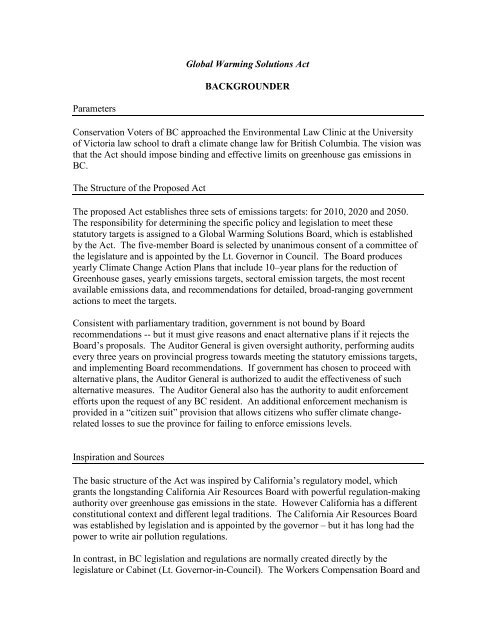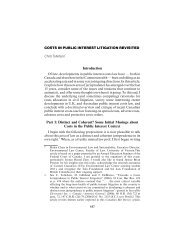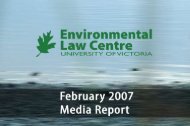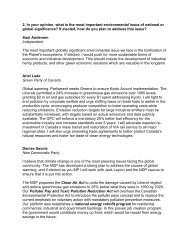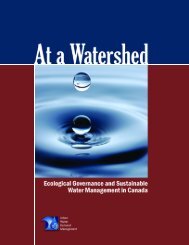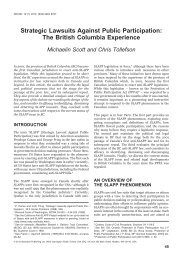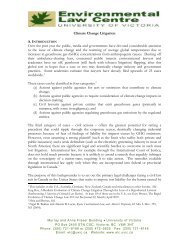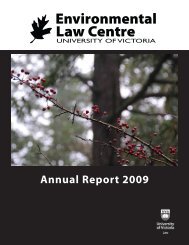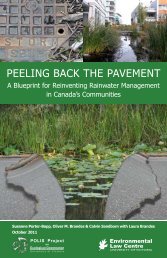Briefing Note on A Climate Change Law For BC - The Environmental ...
Briefing Note on A Climate Change Law For BC - The Environmental ...
Briefing Note on A Climate Change Law For BC - The Environmental ...
You also want an ePaper? Increase the reach of your titles
YUMPU automatically turns print PDFs into web optimized ePapers that Google loves.
Global Warming Soluti<strong>on</strong>s Act<br />
BACKGROUNDER<br />
Parameters<br />
C<strong>on</strong>servati<strong>on</strong> Voters of <strong>BC</strong> approached the Envir<strong>on</strong>mental <strong>Law</strong> Clinic at the University<br />
of Victoria law school to draft a climate change law for British Columbia. <strong>The</strong> visi<strong>on</strong> was<br />
that the Act should impose binding and effective limits <strong>on</strong> greenhouse gas emissi<strong>on</strong>s in<br />
<strong>BC</strong>.<br />
<strong>The</strong> Structure of the Proposed Act<br />
<strong>The</strong> proposed Act establishes three sets of emissi<strong>on</strong>s targets: for 2010, 2020 and 2050.<br />
<strong>The</strong> resp<strong>on</strong>sibility for determining the specific policy and legislati<strong>on</strong> to meet these<br />
statutory targets is assigned to a Global Warming Soluti<strong>on</strong>s Board, which is established<br />
by the Act. <strong>The</strong> five-member Board is selected by unanimous c<strong>on</strong>sent of a committee of<br />
the legislature and is appointed by the Lt. Governor in Council. <strong>The</strong> Board produces<br />
yearly <strong>Climate</strong> <strong>Change</strong> Acti<strong>on</strong> Plans that include 10–year plans for the reducti<strong>on</strong> of<br />
Greenhouse gases, yearly emissi<strong>on</strong>s targets, sectoral emissi<strong>on</strong> targets, the most recent<br />
available emissi<strong>on</strong>s data, and recommendati<strong>on</strong>s for detailed, broad-ranging government<br />
acti<strong>on</strong>s to meet the targets.<br />
C<strong>on</strong>sistent with parliamentary traditi<strong>on</strong>, government is not bound by Board<br />
recommendati<strong>on</strong>s -- but it must give reas<strong>on</strong>s and enact alternative plans if it rejects the<br />
Board’s proposals. <strong>The</strong> Auditor General is given oversight authority, performing audits<br />
every three years <strong>on</strong> provincial progress towards meeting the statutory emissi<strong>on</strong>s targets,<br />
and implementing Board recommendati<strong>on</strong>s. If government has chosen to proceed with<br />
alternative plans, the Auditor General is authorized to audit the effectiveness of such<br />
alternative measures. <strong>The</strong> Auditor General also has the authority to audit enforcement<br />
efforts up<strong>on</strong> the request of any <strong>BC</strong> resident. An additi<strong>on</strong>al enforcement mechanism is<br />
provided in a “citizen suit” provisi<strong>on</strong> that allows citizens who suffer climate changerelated<br />
losses to sue the province for failing to enforce emissi<strong>on</strong>s levels.<br />
Inspirati<strong>on</strong> and Sources<br />
<strong>The</strong> basic structure of the Act was inspired by California’s regulatory model, which<br />
grants the l<strong>on</strong>gstanding California Air Resources Board with powerful regulati<strong>on</strong>-making<br />
authority over greenhouse gas emissi<strong>on</strong>s in the state. However California has a different<br />
c<strong>on</strong>stituti<strong>on</strong>al c<strong>on</strong>text and different legal traditi<strong>on</strong>s. <strong>The</strong> California Air Resources Board<br />
was established by legislati<strong>on</strong> and is appointed by the governor – but it has l<strong>on</strong>g had the<br />
power to write air polluti<strong>on</strong> regulati<strong>on</strong>s.<br />
In c<strong>on</strong>trast, in <strong>BC</strong> legislati<strong>on</strong> and regulati<strong>on</strong>s are normally created directly by the<br />
legislature or Cabinet (Lt. Governor-in-Council). <strong>The</strong> Workers Compensati<strong>on</strong> Board and
the Securities Commissi<strong>on</strong> are excepti<strong>on</strong>s to this pattern, but they are somewhat<br />
anomalous. It was felt that the sometimes <strong>on</strong>erous regulati<strong>on</strong>s needed to address climate<br />
change (regulati<strong>on</strong>s that could create winners and losers) would require more public<br />
legitimacy than mere Board-generated regulati<strong>on</strong>s might possess. Without such<br />
legitimacy, they might fail.<br />
<strong>The</strong>refore, the Act incorporates an approach inspired by the federal Species At Risk Act,<br />
where government is not bound to implement the recommendati<strong>on</strong>s of an independent<br />
board, but must at least give public reas<strong>on</strong>s if it decides to not implement the<br />
recommendati<strong>on</strong>s. <strong>The</strong> proposed Act strengthens this model, requiring not just reas<strong>on</strong>s<br />
but the implementati<strong>on</strong> of an alternative plan. Further, it invokes the powers of the<br />
Auditor General and citizen suit provisi<strong>on</strong>s to encourage compliance with the statutory<br />
purpose.


